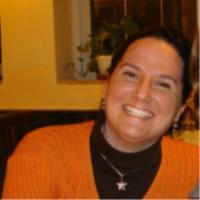Ferrara, Elisa |Italy

Fellow at IAS-STS: 2014/15
Elisa Ferrara was born in Finale Ligure, Italy, on August 4, 1986. She obtained the Law degree (Bachelor) in March 2009 at University of Genova and the "Laurea Magistrale" degree (Master) on International Sciences in March 2012 at University of Turin. Since April 2013 she has been cooperating with NUMIP area of the Signal & Image Processing group at DITEN (Department of Naval Electrical Electronical and Telecommunication Engineering) in research activities.
Since January 2014 she is a Fellow Researcher in Design and assessment of sociological technology services in the field health / rehabilitation: her research topics are concentrated on International regulation and protocol for health data management, interaction and assessment of sociable technologies in health care and rehabilitation technologies. She is co-author of paper presented at international conferences and reviewer in international conferences on interaction of technologies and society as well as spread of technology through society of developing countries.
Project at IAS-STS: User centred system: how gender coud be considered in designining
In order to project a technology system, especially in support to active aging and technology based care systems, it is useful and needed to think about the users of the system itself. Another important step is to conceive the system according to some standards protocols, which allows making the system available for many countries and different kind of people all over the world. In the studies conducted since now, some international user centered protocols have been investigated, like VOLERE, HL7 and IHE concerning data management in health care. VOLERE: The Volere requirements techniques were developed to answer the need for a common language for discovering requirements and connecting them to solutions. The language needs to be understandable by business people, customers, business analysts, engineers, designers, suppliers, testers or anyone else whose input is needed. All of these people have different skills and different views of what is important. A language intended for all of these people must recognize the differences in peoples’ viewpoints and yet have a consistent way of communicating and tracing the relevant knowledge. This realization that requirements is a socio-technical discipline has a strong influence on the development of the techniques. An overview of these results together with the studies that will be conducted in STS institute will be explained during the lecture, focusing in particular on how the conceiving of technology useful in helping active aging or touristic approach systems has been conducted according to gender differences and according to different cultural approaches to the gender Topic.
Publications and conferences
E. Ferrara, S.Nardotto, S.Ponte, SG. Dellepiane. (2014) Infrastructure for data management and user centered rehabilitation in Rehab@Home project. PETRA'14, May 27-30, 2014, Island of Rhodes, Greece. ISBN: 978-1-4503-2746-6 doi>10.1145/2674396.2674419
Dellepiane S., Ferretti R., Ferrara E., “Standards representation in Rehab@home project: from medical data to tele-rehabilitation procedures workflow”, ETSI, FRANCE, 2014.
E.Ferrara, S.Dellepiane, “Rehab@Home: Engaging game based home rehabilitation for improved quality of life” Rome, Siras Conference, 2013.
Accepted : S. Ponte, E. Ferrara, S. Dellepiane, “Home-based system for rehabilitation: improving quality of life through engineering solutions”, Engeneering 4 Society, Raising awareness for the societal and environmental role of engineering and (re)training engineers for participatory design. IEEE Conference June 18 and 19, 2015 Leuven, Belgium
